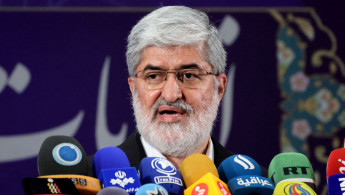Iran wanted to create nuclear bomb but couldn't keep it quiet, says ex-MP
Iran wanted to create a nuclear bomb from the start of its atomic programme - which Tehran insists is purely peaceful - a former MP has told media.
Ali Motahari, an ex-second vice-speaker at the Iranian parliament, told the Iran Student Correspondents Association (ISCA) news agency that Tehran was ultimately unable to keep its efforts quiet about planning to build a nuke.
It comes as world powers continue to negotiate a revival of the 2015 Iran nuclear deal, which promised sanctions relief in return for limits on Tehran's nuclear aspirations.
Motahari said: "From the very beginning, when we entered [into] nuclear activity, our goal was to build a bomb and strengthen the deterrent forces.
"But we could not maintain the secrecy of this issue, and the secret reports were revealed by the group of hypocrites."
He appeared to be referring to the National Council of Resistance of Iran opposition group - which includes the People's Mujahedin of Iran - which is headquartered in Europe, according to Anadolu Agency.
The former lawmaker issued a statement on Monday, arguing that his comments had been incorrectly understood, according to the London-based Iran International broadcaster.
He said: "It was said [to ISCA] that there were several people in the beginning who believed that there was no problem with building [a nuclear] weapon to inspire awe in the enemy… but that using it was not permissible.
"This led the hypocrites to report the Islamic Republic's nuclear activities as [an effort] to build bombs."
Iran has long insisted that it has no intention of building a nuclear weapon citing a fatwa from Supreme Leader Ayatollah Ali Khamenei against the bomb.
After being asked about this policy, Motahari told ISCA that states wishing to use nuclear technology for peaceful purposes don't begin with enriching nuclear materials.
"But the fact that we enrich directly creates the illusion that we want to make a bomb," he said.
Iran International reported that the ISCA deleted the contentious remarks made by the former lawmaker from its article, leaving the line: "The Supreme Leader believes that building nuclear weapons is completely impermissible."
US ambassador to the UN @LindaT_G speaks with @IbtisamAzem to discuss the US position on Ukraine, the Iran nuclear deal, Israel's occupation and violence in East Jerusalem, Yemen's ceasefire, and Libya ⬇ https://t.co/5zFesjcQ7C
— The New Arab (@The_NewArab) April 26, 2022
The Iran nuclear deal was first agreed in 2015 under then-US President Barack Obama and involves other major world powers, such as Russia, China, and the UK.
In 2018, former President Donald Trump pulled Washington out of the agreement, with Iran then starting to breach its obligations under the pact one year later.
The US, Iran, and the other parties to the deal, formally known as the Joint Comprehensive Plan of Action (JCPOA), have been working to secure a return to the deal in the Austrian capital Vienna.
A final agreement is still yet to be reached and the future of the discussions, which began last year, remains uncertain.





 Follow the Middle East's top stories in English at The New Arab on Google News
Follow the Middle East's top stories in English at The New Arab on Google News
![Netanyahu furiously denounced the ICC [Getty]](/sites/default/files/styles/image_330x185/public/2024-11/GettyImages-2169352575.jpg?h=199d8c1f&itok=-vRiruf5)
![Both Hamas and the Palestinian Authority welcomed the ICC arrest warrants [Getty]](/sites/default/files/styles/image_330x185/public/2024-11/GettyImages-2178351173.jpg?h=199d8c1f&itok=TV858iVg)
